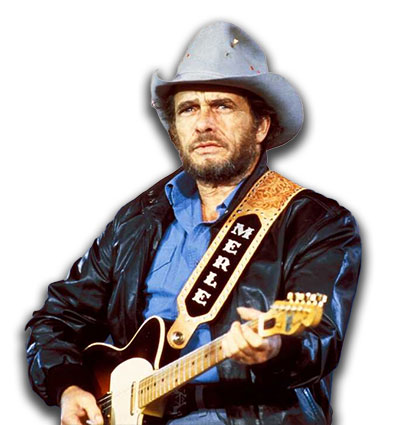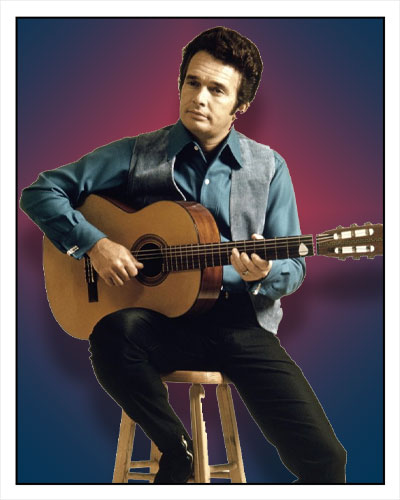 |


And there ain't nothing quite as sad
As watching your heroes die
One by one as they fall
Soon there'll be no heroes at all!
Who's going to fill their shose?
 |
|||
Merle Ronald Haggard (April 6, 1937 – April 6, 2016) was an American country music singer, songwriter, guitarist, and fiddler.
In a genre where performers and writers often are separated into distinct camps, Haggard has written the lion's share of his hits, and nearly all of the greatest ones--among them classics like "Swinging Doors," "The Bottle Let Me Down," "Mama Tried" and "Hungry Eyes." Born April 6, 1937 in Bakersfield, California, Haggard had a childhood filled with the same kind of hardships that his songs would later contain. He lived part of childhood in a converted boxcar. He spent three years in San Quentin for burglary (California governor Ronald Reagan pardoned him in 1972). After being released from San Quentin State Prison in 1960, he managed to turn his life around and launched a successful country music career. He gained popularity with his songs about the working class; these occasionally contained themes contrary to the anti–Vietnam War sentiment of some popular music of the time. Between the 1960s and the 1980s he had 38 number-one hits on the US country charts, several of which also made the Billboard all-genre singles chart. Haggard continued to release successful albums into the 2000s. He received many honors and awards for his music, including a Kennedy Center Honor (2010); a Grammy Lifetime Achievement Award (2006); a BMI Icon Award (2006); and induction into the Nashville Songwriters Hall of Fame (1977); Country Music Hall of Fame (1994) and Oklahoma Music Hall of Fame (1997). He died on April 6, 2016—his 79th birthday—at his ranch in Shasta County, California, having recently suffered from double pneumonia. Few country artists have been as popular and widely admired as Mr. Haggard, a ruggedly handsome performer who strode onto a stage, guitar in hand, as a poet of the common man. Thirty-eight of his singles, including “Workin’ Man Blues” and the 1973 recession-era lament “If We Make It Through December,” reached No. 1 on the Billboard country chart from 1966 to 1987. He released 71 Top 10 country hits in all, 34 in a row from 1967 to 1977. Seven of his singles crossed over to the pop charts. He was always the outsider. His band was aptly named the Strangers. Unlike his friend Johnny Cash, Mr. Haggard didn’t merely visit San Quentin State Prison in California to perform for the inmates. Convicted of burglary in 1957, he served nearly three years there and spent his 21st birthday in solitary confinement. Mr. Haggard went on to write “Mama Tried,” “Branded Man” and several other candid songs about his incarceration, all of them sung in a supple baritone suffused with dignity and regret. Many of his other recordings championed the struggles of the working class from which he rose. Defying the conventions of the Nashville musical establishment, Mr. Haggard was an architect of the twangy Bakersfield sound, a guitar-driven blend of blues, jazz, pop and honky-tonk that traced its roots to Bakersfield, Calif. In Mr. Haggard’s case the sound defined a body of work as indelibly as that of any country singer since Hank Williams. Mr. Haggard cited Lefty Frizzell, Elvis Presley, Jimmie Rodgers, Chuck Berry and Bob Wills as among the artists who influenced his sound. “I thought, if I combine all that, maybe I can come up with something sustaining,” he told the magazine LA Weekly in 1999. |
 Few artists have matched the impact that Merle Haggard has had on country music as both a singer and writer. Hank Williams, perhaps. Maybe Jimmie Rodgers or Bill Monroe.
Few artists have matched the impact that Merle Haggard has had on country music as both a singer and writer. Hank Williams, perhaps. Maybe Jimmie Rodgers or Bill Monroe. 